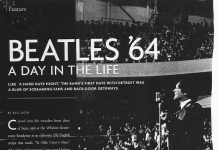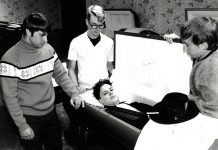
How do you follow a legend? Yuval Sharon is going to do his best ŌĆö in his own way. Sharon has been named the Gary L. Wasserman artistic director at Michigan Opera Theatre. HeŌĆÖs the first to take on the role since it was held by the late Dr. David DiChiera, who founded the opera company in 1971, retired in 2014, and served as artistic director until 2017.
Sharon founded his own opera company, The Industry, in Los Angeles 10 years ago. As its artistic director, he was known for unconventional takes like his fall 2015 production of Hopscotch, a mobile opera that had 24 cars and 126 artists performing all over the city ŌĆö from rooftops to abandoned parking lots ŌĆö and was streamed for free viewing.
From 2016 to 2019, he was the first artist-in-residence at the Los Angeles Philharmonic, where he created projects that included newly commissioned works, site-specific installations, and performances outside the hall. In 2017, he received both a MacArthur Fellowship and a Foundation for Contemporary Arts grant in theater.
Now heŌĆÖs turned his gaze to Detroit, where he planned to began his tenure with Twilight Gods, a production of scenes from Richard WagnerŌĆÖs final opera, Ring Cycle, in October. It was to be staged in a most unconventional, COVID-19 kind of way: in the Detroit Opera House Parking Center ŌĆö all seven floors of it ŌĆö with patrons watching from their vehicles.
Yuval spoke to us in early September about bringing this elevated art form to the masses ŌĆö and about why he chose Detroit

ŽŃĖ█┴∙║Ž▓╩═╝┐Ōū╩┴Ž: How did you get into opera?
Yuval Sharon: I started college [at University of California, Berkeley] thinking I wanted to go into film. Then, while I was at Berkeley, I was getting to know opera more and more and going to the San Francisco Opera on my own, which was a big departure for me because previously I was only going when my dad would drag me, relatively unwillingly at first, and more and more it started to be a very fun exercise for my dad and I to do together. But it wasnŌĆÖt until I spent a year after graduating [working at Komische Oper Berlin in Germany] and going to see opera in Berlin that I really started to think of opera as a viable art form and as a contemporary art form that has a lot of potential. From there, it was very hard to do theater that wasnŌĆÖt propelled by music.
Do you sing?
I do not. I sang in high school choruses, I starred in some high school musicals, but I will certainly not say that I can sing, and I certainly do not have a trained operatic voice in any way.
What appealed to you about Michigan Opera Theatre ŌĆö and about Detroit?
ThereŌĆÖs a lot of things that appeal to me, but if I have to choose one, it would be the city of Detroit and metropolitan Detroit area for its diversity and for its incredible history. ItŌĆÖs a remarkably complex, challenging history that I think offers so much that needs to be spoken to that I think art can speak to so powerfully. The additional appeal, of course, is IŌĆÖm excited and intrigued by the various locations around Detroit. I love the Detroit Opera House ŌĆö I think itŌĆÖs a beautiful house with a great acoustic ŌĆö but doing opera outside of the theater is something IŌĆÖve done a lot with my company in Los Angeles thatŌĆÖs been very successful. I find it so exciting to think about doing that in Detroit, where there are so many fascinating buildings with an incredible history. I think we can do a lot to increase the accessibility and the relevance of opera and make it feel really directly connected to our everyday life in Detroit.
WhatŌĆÖs it like to take on a new role like this in the middle of a pandemic?╠²
In many ways, if it wasnŌĆÖt for this pandemic, I think on either side ŌĆö the MOT side and my side ŌĆö maybe we would have felt that things can keep continuing with incremental change, and maybe I might have been more than happy to have stayed playing my role at The Industry with my independent kind of outsider perspective, trying to effect change from the outside. But with everything happening, I thought this was really a moment to engage more deeply with these institutions and this notion of how to truly move this conversation forward ŌĆö I would like to say for opera, but really beyond that, about the arts in general and what the arts can do to help us get through this difficult time.
Where did the parking structure performance idea come from?
It came about through a conversation with President and CEO Wayne Brown even before talking about the larger role of artistic director. He was the very first person in the opera world to reach out to me to say, ŌĆśCan we think of something that can be done in a socially distant way, to be as safe as possible for our audiences and our artists?ŌĆÖ The opera house was not an asset we could deploy at this point, but we have another asset, which is the parking center, a seven-story parking center that is actually quite well designed.
How do you view your role at MOT going forward?
My approach to MOT is going to be focused very much on evolution ŌĆö evolving the art form ŌĆö and by doing that, I hope to evolve the company. ItŌĆÖs about finding new audiences, making sure audiences see opera in a different light, and making sure audiences that already love the opera come along with us. ItŌĆÖs not going to be a revolution; itŌĆÖs going to be an evolution.
|
| ╠² |
|








